Jersey City, NJ Pollen and Allergy Report for Summer 2023
Pollen Allergy Trends in Jersey City, NJ
When is pollen lowest in Jersey City, NJ?

February
Lowest month total PPM
Avg. PPM
When is pollen highest in Jersey City, NJ?

April
Highest month total PPM
Avg. PPM
How does pollen in Jersey City, NJ compare to New Jersey?
Jersey City has a higher average PPM than the state of New Jersey.
Jersey City yearly avg PPM:
New Jersey yearly avg PPM:
How does pollen in Jersey City, NJ compare to the USA?
Jersey City has a higher average PPM than the USA.
Jersey City yearly avg PPM:
USA yearly avg PPM:
Is pollen worse this year in Jersey City, NJ?
Spring 2023 was worse than spring 2022.
Spring 2023 PPM:
Spring 2022 PPM:
Average PPM in Jersey City, NJ
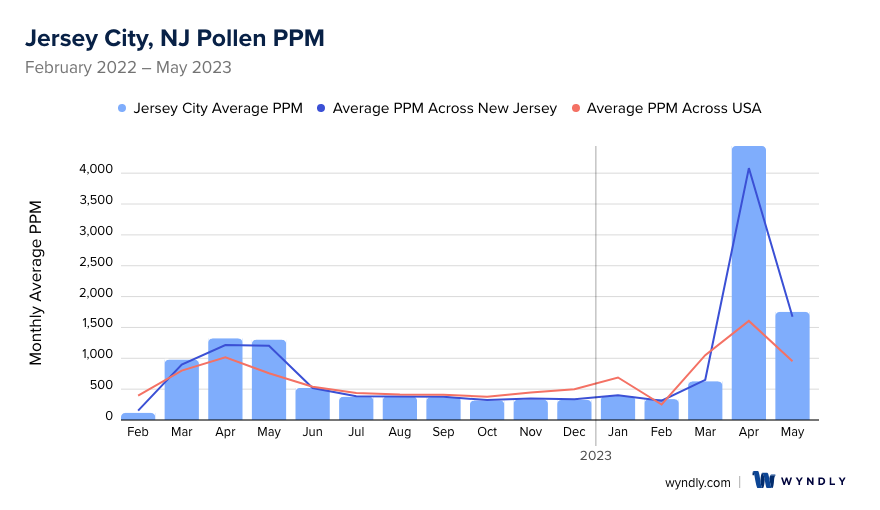
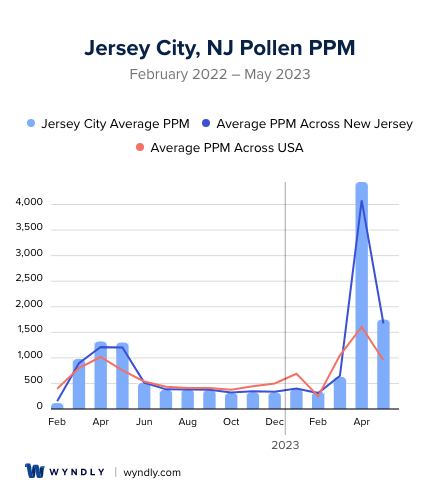
Jersey City, NJ Pollen and Allergy Breakdown by Month
Grass
When is grass pollen highest in Jersey City, NJ?
April has the highest grass pollen in Jersey City, NJ with an average PPM of
When is grass pollen lowest in Jersey City, NJ?
December has the lowest grass pollen in Jersey City, NJ with an average PPM of
Tree
When is tree pollen highest in Jersey City, NJ?
April has the highest tree pollen in Jersey City, NJ with an average PPM of
When is tree pollen lowest in Jersey City, NJ?
January has the lowest tree pollen in Jersey City, NJ with an average PPM of
Weed
When is weed pollen highest in Jersey City, NJ?
April has the highest weed pollen in Jersey City, NJ with an average PPM of
When is weed pollen lowest in Jersey City, NJ?
February has the lowest weed pollen in Jersey City, NJ with an average PPM of
Jersey City, NJ Pollen Monthly Breakdown by Pollen Type
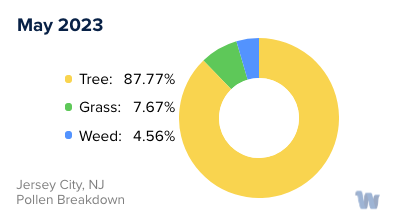
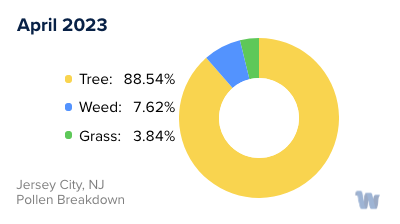
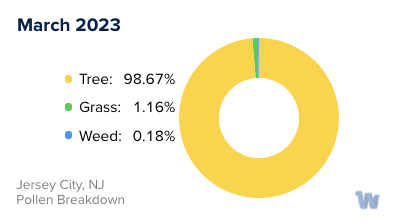
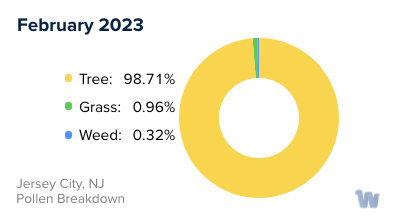
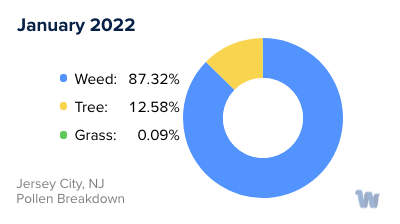
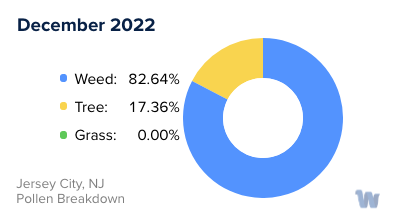
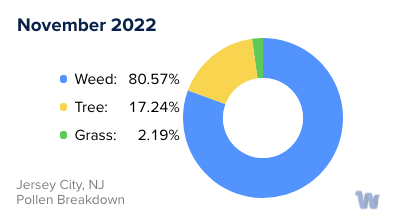
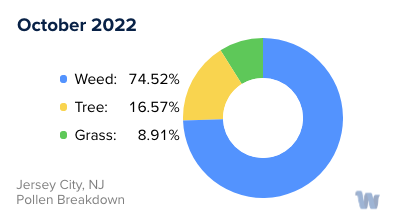
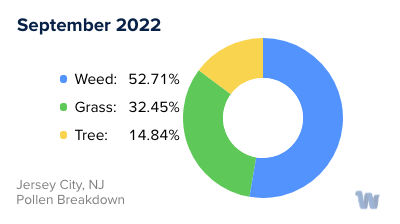
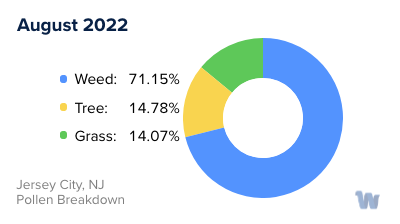
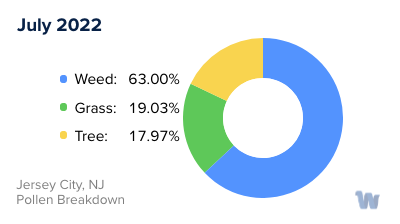

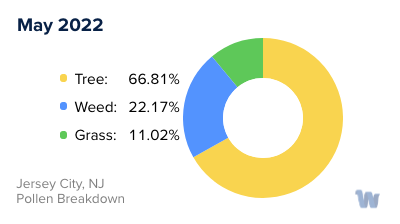
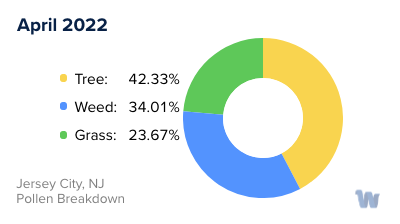
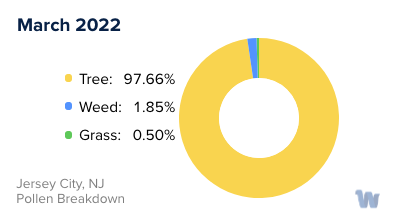
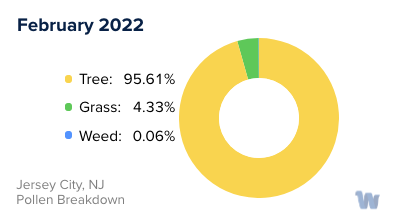
Pollen and Hay Fever in Jersey City, NJ
Pollen allergies, often referred to as "hay fever," are a common cause of seasonal discomfort for many residents of Jersey City, New Jersey. These allergies, also known as allergic rhinitis, result from an overreaction of the body's immune system to pollen, a type of fine powder produced by various plants for reproductive purposes.
In Jersey City, the key contributors to pollen allergies are trees, grasses, and weeds, each releasing their pollen during specific seasons. Among trees, oak, pine, and maple are the primary culprits. Their pollen season tends to be in the spring, when the weather starts to warm up. For some people, this means the arrival of spring is often accompanied by bouts of sneezing, itchy eyes, and a runny nose.
Grasses, including species such as ryegrass and Timothy grass, generally release their pollen in late spring and early summer. Those beautiful, sun-filled days that coax us outdoors can often be the days when grass pollen counts are at their peak.
Weeds, like ragweed, are another source of pollen that can cause allergic reactions. Ragweed pollen season typically begins in late summer and can extend into the fall. This means that for some people, their allergies can persist long after the summer fun has faded.
The exact timing and severity of these pollen seasons can vary year by year, influenced by factors such as weather conditions and temperature. Warm, windy days tend to be high pollen days, as the wind can carry the pollen over long distances. Conversely, rainy days can provide temporary relief by washing the pollen out of the air.
For those living in Jersey City, understanding the types of pollen and their respective seasons can help in anticipating and managing seasonal allergies. It's important to remember that while pollen allergies can be bothersome, they are a natural response to the changing seasons and the cycle of life in the plant world.

